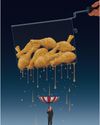
IT SHOULD HAVE BEEN A CELEBRATORY LUNCH-THE KIND WHERE YOU ORDER FRENCH FRIES AND CHEESECAKE, THEN GO HOME TO NAP AND DON'T EVEN FEEL BAD ABOUT IT.
Instead, Stacey Abrams and Lara Hodgson were sitting in an Atlanta restaurant, dazed with disappointment, talking in circles, returning again and again to the same confounding question: How did we not know this?
It was 2010, and three years earlier, the women had cofounded a company called Nourish, which made grab-and-go baby bottles filled with premeasured, purified water for easy formula mixing. The company had been finding its legs, one wobbly step at a time. Then, Whole Foods placed a huge order of their product.
"It was, like, orders of magnitude bigger than anything we'd done before," Hodgson says. They were ecstatic. This is what they should've been celebrating. But then they read the payment terms. "We discovered that we weren't going to get paid for three to four months. I mean, no small business can handle that."
The women had run headlong into an unspoken rule: the bigger the buyer, the longer they take to pay. And it didn't even matter what the official payment schedule was. "If your invoice says net 30 or net 60 or net 90-that's just a suggestion," Hodgson says. "We know now that the average net 30 invoice pays in 54 days. But back then, when we realized all this, I just remember thinking, like, Was I sick one day in business school? Why does no one talk about this?"
They had more questions, too. Why was this the status quo? Why did no one seem to think it was a big deal? And why-in a country that calls small businesses the backbone of the economy-had no one bothered to create a better solution?
This story is from the {{IssueName}} edition of {{MagazineName}}.
Start your 7-day Magzter GOLD free trial to access thousands of curated premium stories, and 9,000+ magazines and newspapers.
Already a subscriber ? Sign In
This story is from the {{IssueName}} edition of {{MagazineName}}.
Start your 7-day Magzter GOLD free trial to access thousands of curated premium stories, and 9,000+ magazines and newspapers.
Already a subscriber? Sign In

Chords of Success
For Saahil Goel, the deep-rooted passion for playing the guitar dates back to his high school days. Influenced by legends like Pink Floyd, Led Zeppelin, and the Pakistani band Strings, his musical journey mirrors his leadership style-balancing focus, discipline, and a collaborative spirit. Goel feels that playing guitar has enhanced his ability to balance focus and teamwork as a founder of an eCommerce shipping start-up.

IS YOUR RENT TOO DAMN HIGH?
Many small business owners struggle with their rents. Here's what to do.

HOW TO BOUNCE BACK FROM A BAD REVIEW
A one-star review can hurt your ego - and your business. But it's possible to prevent (and remedy!) this scary scenario.

HOW TO HIRE FOR THE FUTURE
Small businesses are struggling to find quality labor. So flip the conversation: Show workers how your business will set them up for opportunity.

You Can Hire Like Netflix
The streaming platform built an incredible team with a strategy called “talent density.” But you don’t need to be a tech giant to do it.

Speedy Growth Killed My Startup
We seemed to be rocking it - lots of press, major partnerships. Then we learned the harsh consequences of overlooking our customers.

Three Pivots to $100 Million
How do you find a working business model? Do it like Rowan-a brand that reinvented itself many times before finally piercing the ear-piercing market.

What Goals Actually Matter?
Some benchmarks are more important than others so what should you really care about? We asked six founders for their hardest-won lessons.

'Only the Strongest Are Going to Survive'
Brian Lee cofounded companies like LegalZoom and ShoeDazzle-and he believes a lot of conventional business wisdom is backward. Sure, it's harder to raise capital. But it's actually cheaper than ever to start a company.

HOW TRUST SAVED KFC
The former CEO of Yum! Brands explains how he turned around a struggling KFC-and the important lesson it offers for anyone in franchising.